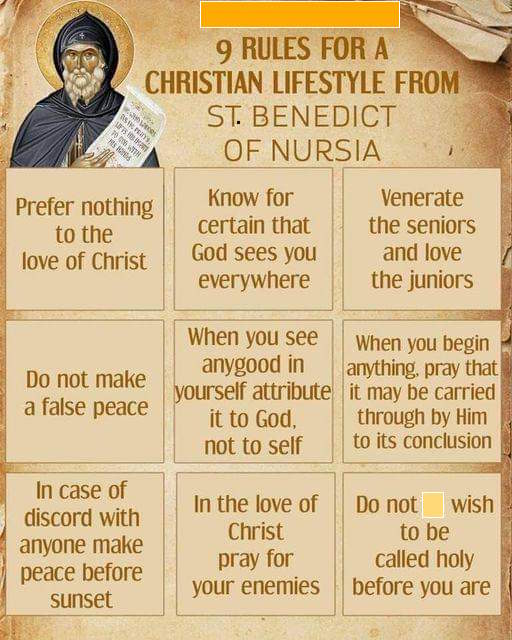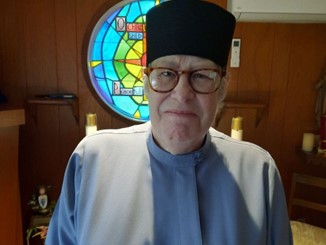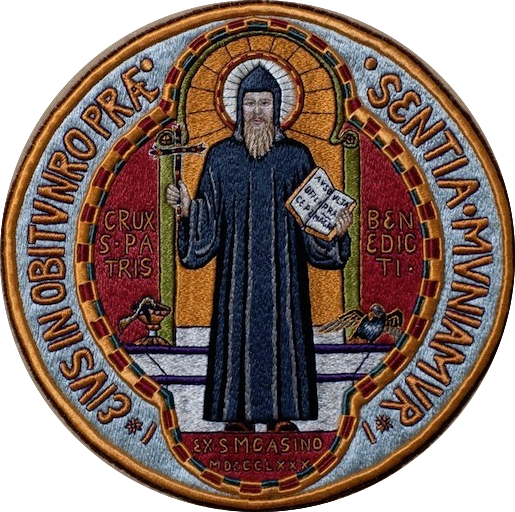The IBC is an international organization consisting of monastic and Oblate communities, following the Rule according to St. Benedict (480-547 AD).
We are founded on the ancient ideal of Christian life that we have inherited from our spiritual forefathers. Hence our approach is inclusive, and Christians of all faith traditions are welcome to join us as members.
Because our way to spirituality is a positive, uplifting, attitude towards God and neighbor, our community places the strongest emphasis on the development of the human consciousness through the refinement of Christian love towards God’s creation as a whole. Our interaction with other beings (other people and other elements of God’s creation) is the outer indicator of inner spiritual development.
The Gospel truth is not just a body of knowledge but a way of life. We respect and encourage each other on our journey toward the ideal of spiritual formation.

Our Benedictine Communities
Our Lady of Sorrows
Oblate Chapter in Hamilton, NJ
St. Joseph Of Animathea
Skete and Oblate Chapter in Lincoln, Nebraska
Holy Resurrection Monastery
Uganda
Your Community
Your Community
Your Community
Upcoming Community Events
St. Joseph of Arimathea Oblate Chapter: next meeting – visit Saint Joseph of Arimathea Chapel – Activities Calendar (saintjosephchapel.us) for date and time.
Our Lady of Sorrows Oblate Chapter: next meeting, Saturday, February 7th, 2026, at 10 AM (EST).
Meetings are via Zoom. Visit www.olsoblates.org for more information or contact us at smj@thebenedictines.com to request an invitation to the next meeting.
New Benedictine Inquirer’s Group Forming: Come and see how Benedictine spirituality can change your life in this informative course. Meeting monthly via Zoom, the 5-session program will introduce you to the basics of Benedictine spirituality. Open to Christians of all faith traditions, with the option to join a Chapter at the conclusion of the program. First class is on Saturday, March 7th. Contact our Provincial Director, Sr. Mary Joseph, OSB, to register or for more information.
Annual Oblate Retreat 2026: A date has not been set for 2026 – please check back for updated information. You can also contact the Provincial Director to express your interest and get updates. All Christians are welcome to attend – you do not need to be an Oblate to join us. Come and see how Benedictine spirituality can change your life.
g
Benedictine Resources
- What is a Benedictine Oblate?
- Saint Benedict suggests a way on which we will be able to let go of our “ego” a bit at a time and become open to the fullness of life. What he recommends to the Abbot of the monastery, for instance, is helpful for us all: Sobriety not only of the stomach but as a basic attitude of mindfulness: To courageously letting go of thoughts, desires and emotions, in order to face our own truth, to accept the reality of ourselves and become merciful to others. Our Oblate Chapter is an invitation to discover what God has in store for each one of us every day.
- Oblates are everyday people with jobs, families and other responsibilities. They can be clergy or laity and come from a variety of Christian faith traditions. Originally, St. Benedict used the term Oblate (from the Latin word oblatus – “one who is offered”) to refer to children who were offered to the monastery by their parents in order to be raised and educated there, presumably to become monastic when of age.
- By their commitment to the Rule of Benedict, modern-day Oblates benefit from an ancient spiritual tradition that has led countless other monastics and Oblates to holiness. Just as candidates for the monastery are tested to see whether they “truly seek God” (RB 58), so are those who seek to become Oblates. They become committed above all else to seek God in Jesus Christ.
- The Benedictine motto ora et labora [pray and work] cooperates with God’s plan to make all things new, to always be in conversation with God through prayer and to value the dignity of work and human activity.


How to join our International Community
- We invite other established Benedictine communities (both monastic and Oblates) to join our International Benedictine Chapters (IBC). They do not need to be Orthodox, since the Benedictine way is interdenominational (“accept all as Christ” – the Rule of St. Benedict, chapter 53, verse 1). After prayerful consideration, the Superior of any Benedictine community is invited to contact the IBC, requesting admission and providing the following information:
- Name, location (physical address), email and website (if any)
- Founding year
- A listing of all members (by name and by the categories of “Oblate,” “Novice,” “Postulant” or “Professed [monastic]”)
- Monastic communities of the IBC, while overseen by the Provincial Director, each have their own standards for formation, following the Rule and principles of Benedictine spirituality. Oblate Chapters are a part of the St. Joseph of Arimathea Skete, and under the administration of the Abbot and Provincial Director.
- All IBC community members believe in service to the common good, respect for the individual, virtuous friendship, living the Beatitudes (Matthew 5:3-12) and adhere to the following values:
- 1. Conversion of life towards God’s will
- 2. Love of learning
- 3. Listening
- 4. Excellence through virtue
- 5. Hospitality
- 6. Stability
- 7. Stewardship
IBC Administrative Structure
-
Abbot: (Most Rev.) Mar Melchizedek, OSB

- Provincial Director: Rev. Deaconess Sr. Mary Joseph, OSB

The Provincial Director oversees:
- Monastic Communities
- Oblate Directors (Chapters)
- IBC Programs
- Annual Retreat
Benedictine Vocation
Postulancy
- Postulancy is the initial stage of formation for a monastic candidate, and this time of formation is determined by each monastery. The monastic candidate should consult with the Abbot of the monastery they wish to join for more information.
The Benedictine Oblate Vocation
There are, in the ancient tradition of the Rule of St. Benedict, specific formation steps for both Oblate and Associate members of the IBC as follows:
I. Benedictine Inquirers Group
This group meets for five months and is for all those interested in learning more about Benedictine spirituality, whether they decide to join a Chapter or not. Attendance at all meetings of the group is the required first step in formation for any person interested in becoming an Associate or Oblate in any IBC Chapter. Next session begins Saturday, March 7, 2026. Contact the Provincial Director at provdir.ibc@gmail.com to register or for more information.
Upon completion of the five sessions, Associate members are received into a Chapter; a candidate desiring to become an Oblate and advance to Novitiate must attend a sixth session before Investiture.
II. Novitiate
- This is usually a nine to twelve month period, during which the Novice explores on a deeper level what it means to live as an Oblate. The resolve and suitability of the Novice is further discerned. There is concentration on developing a solid contemplative foundation:
- The Novice commits to following the Rule of St. Benedict.
- The new Novice may receive a ring, lapel pin, bracelet or necklace, which he or she may wear as appropriate and desired.
- The Novice is asked to wear moderate clothing, preferably of darker hue.
- The Brother or Sister becomes more fully acquainted with the many facets of Oblate or monastic life.
- Instruction by the Chapter or Spiritual Director is given on the Benedictine Rule, the Liturgical Hours (depending on individual’s faith tradition), spiritual growth and development.
- The Novice continues to internalize and live by the spiritual and religious principles of Oblate life.
Once ready, the Novice then may go on to the next step: Oblation.
III. Oblation
The Oblate Novice is received as full member of the Chapter. There are two stages: First Oblation, for one year, and Final Oblation, which is for life. At First Oblation the new member may be clothed in the Benedictine Habit, if they wish and wear it as desired and appropriate. All Oblates may be buried in the Habit, even if not clothed at Oblation.
Notable Benedictine Oblates
- St. Thomas Becket, Archbishop of Canterbury and martyr (†1170)
- St. Thomas Aquinas, child Oblate at Monte Cassino (†1274)
- St. Thomas More, lawyer, martyr (†1535)
- St. Oliver Plunkett, Archbishop of Armagh, martyr (†1681)
- Elena Cornaro Piscopia, scholar, philosopher, musician and first woman to receive a Doctorate Degree (†1684)
- Joris-Karl Huysmans, writer (†1907)
- Dorothy Day, social activist (†1980)
- Jacques (†1973) and Raissa (†1960) Maritain, philosophers
- Walker Percy, Southern American novelist (†1990)
- Margaret Rumer Godden, English author (†1998)
- Paul Claudel, French poet and playwright (†1955)
- Sir Alec Guiness, British actor (†2000)
- Rose Kennedy (†1995)
Suggested Prayer Books
for the Work of God
The following are Office books recommended by the Skete for use by our Oblates, Associates and anyone wishing to participate in daily prayer. They cover various faith traditions and are for all levels of experience.
“Benedictine Daily Prayer (A Short Breviary)
Benedictine Daily Prayer: A Short Breviary: Maxwell E. Johnson, Editor, with the Monks of Saint John’s Abbey. Leather-like cover with ribbons.
Available from Liturgical Press; ISBN: 9780814628331
“Saint Benedict’s Prayer Book”
Though listed as “for beginners,” it is really a good prayer book for all on the Benedictine path.
Available from Amazon. ISBN-13 978-0814624319
“Work of God: Benedictine Prayer” For those looking for an everyday grounding in Benedictine spirituality and who wish to pray according to the Benedictine style of Liturgy of the Hours. While written primarily for Benedictine oblates, this simple yet elegant prayer book also gives the unfamiliar user a starting place from which to progress into a more intense practice.
Available from Amazon. ISBN-13 978-0814624319
“The Divine Hours” written by Phyllis Tickle.
A contemporary Book of Hours to guide Christians gently yet authoritatively through the daily offices, “The Divine Hours” is the first major literary and liturgical reworking of the sixth-century Benedictine Rule of fixed-hour prayer. Three volumes (sold individually) or in a smaller, pocket edition.
Prayers for Summertime: available on Amazon. ISBN-13 978-0385504768
Prayers for Autumn and Wintertime: available on Amazon.
ISBN-13 978-0385505406
Prayers for Springtime: available on Amazon. ISBN-13 978-0385505574
The Divine Hours, Pocket Edition: available on Amazon.
ISBN-13 978-0195316933
Christian Prayer: The Liturgy of the Hours (Roman Catholic)
The official one-volume edition of the internationally acclaimed Liturgy of the Hours. This regular edition of Christian Prayer contains the complete texts of Morning and Evening Prayer for the entire year.
Available on Amazon. ISBN-13 978-0899424064
The Lutheran Book of Prayer
Personal prayers are included for almost any life circumstance, including for morning and evening, worship, our world, our neighbors, ourselves, and the sick.
Available on Amazon. ISBN-13 978-0758608598
The Book of Common Prayer
This is the standard Book of Common Prayer for the Episcopal Church.
Available on Amazon. ISBN-13 978-0898690613
My Daily Orthodox Prayer Book: Classic Orthodox Prayers for Every Need Here are pages of classic Orthodox prayers for every occasion and need, including praying the Daily Hours, establishing a Daily Rule of Prayer; Morning and Evening Prayers and more.
Available on Amazon. ISBN-13 978-1667853178
The Ancient Faith Prayer Book (Orthodox)
Edited by Archimandrite Vassilios Papavassiliou, the Ancient Faith Prayer Book brings together the most ancient and popular prayers of Orthodox Christians in elegant contemporary English and presented in a compact format (4-1/2 X 7 inches) for ease of use.
Available on Amazon. ISBN-13 978-1936270903
A Manual of Eastern Orthodox Prayers
Morning and evening prayers, communion prayers, selected troparia and prayers for various occasions.
Available on Amazon. ISBN-13 978-0881410129
